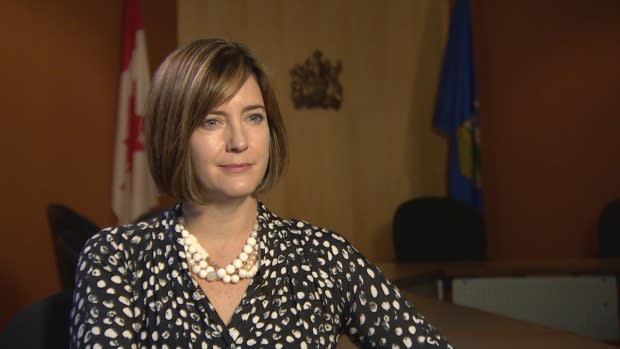Alberta privacy commissioner shares guide on GSA disclosure
In a rare move, Alberta's privacy commissioner has weighed in on a pending piece of legislation, providing school boards with a guide on when it's reasonable to disclose students' participation in gay-straight alliances.
The advisory from commissioner Jill Clayton doesn't make any changes to provincial privacy laws, but focuses on making student privacy rights more clear.
In a statement, Clayton said she has been following the hotly debated question of when it's appropriate for a teacher to tell a guardian their child is in a GSA.
"There have been many perspectives in this debate and various interpretations – or misinterpretations – about how Alberta's privacy laws apply to a student's participation in a GSA," said Clayton Tuesday.
Commissioner's office spokesperson Scott Sibbald said the goal of the advisory is to provide school boards with an easy-to-understand framework of the Personal Information Protection Act and the Freedom of Information and Protection of Privacy Act.
'Interpretation and discretion'
The advisory notes both acts apply to student participation in GSAs and other clubs. However, there are some exceptions under PIPA where disclosure could be necessary, like for the purposes of an investigation or in an "emergency that threatens the life, health or security of an individual or the public."
Other exceptions could be considered matters of opinion, including those under the FOIP Act.
If, for example, "disclosure will avert or minimize a risk of harm" or "disclosure would not be an unreasonable invasion of the individual's personal privacy," a student's personal information could be shared.
Rakhi Pancholi, NDP MLA for Edmonton-Whitemud, said that's a problem.
"There's a lot of provisions in the act that allow for interpretation and discretion, and I think that's part of our concern," said Pancholi, a lawyer who led the drafting of the Education Act while working for the government from 2008 to 2013.
Sibbald acknowledged that ensuring all schools interpret the framework the same way would be challenging. But, he said if there are concerns about how the rules are being followed, schools would need to prove the disclosure of a student's personal information was justified.
"The approach seems to be to out kids first and then expect them to go to the privacy commissioner to assert their privacy," Pancholi said.
"If the Minister of Education thinks that that's what kids should do — be outed and then go to assert their privacy rights — I think that's really troubling because that's not actually helping kids."

Education Minister Adriana LaGrange said she believes in the ability of staff at Alberta schools to interpret the framework in a way that keeps students safe.
"We trust teachers to make decisions each and every day regarding the health and often times even mental health and wellness of our students," LaGrange said. "We are continuing to place our trust in our teachers and administrators to do that good work."
LaGrange said she's pleased the commissioner weighed in, as it confirms the United Conservative Party government's repeated statements that protections for LGBTQ students in Alberta will be the strongest in Canada.
Minors' privacy rights
Bill 8, introduced on June 5, amends the Education Act that was passed but never proclaimed by past Progressive Conservative governments.
The new act does not have the Bill 24 protections enacted by the NDP in the fall of 2017, which made it illegal for teachers to potentially out students by telling guardians if their child joined a GSA.
LaGrange said she'll ask her minister's youth panel this summer if schools boards should make an effort to inform students of those rights.
Clayton also said students must understand they have rights under privacy laws.
Her advisory also highlighted how schools should consider if a student is a mature minor before disclosing their information. A mature minor is someone "who understands the implications of giving consent such that a school would need the student's consent and not that of the parent to disclose," according to the advisory.
Pancholi said making that distinction is challenging.
"Kids who are 12 or 13 or 14 years old are not going to be considered mature minors. Their consent is not going to be sought by school administrators before their personal information is disclosed to parents."
